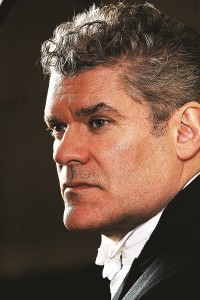Archive
Renowned pianist finds inspiration in unlikely places
May 28, 2013 · 0 Comments
By Brock Weir
When the New York Rangers fell to the Boston Bruins in this year’s playoffs on Saturday, few people probably took it harder than William Wolfram.Wolfram, a New York based pianist has always had an affinity for the original six team league, but also has a special place in his heart for the Edmonton Oilers. The Oilers, after all, when they were on their Stanley Cup winning streak in the 1980s, played hockey the way he always wanted to play the piano – creative, skilled, and fluid.
“There are teams that win with all sorts of different hockey styles,” he says. “The New Jersey Devils won a couple of cups, but I would never want to play the piano the way they play. They won, they deserved it, but it was by essentially sucking the life out of the other team. It was a defensive system I just thought was so stultifying and boring.
“They couldn’t even fill their own arena a lot of the time and I would never want to play piano like that.”
Filling arenas, or at least concert halls, is rarely a problem for the piano virtuoso, who has played the world’s grandest concert halls, legendary smaller venues, and picked up numerous awards and honours along the way. But Mr. Wolfram is set to get back to his more intimate roots this Friday at the Aurora Cultural Centre as the final artist in this season’s Great Artists Piano Series.
The Great Artists series is facilitated by local musicians and award-winning record producers Norbert and Bonnie Kraft. The duo produce with the classical Naxos label and through this line of work, they have become friends with Mr. Wolfram.
Whether he is playing the vast hall of Carnegie Hall or the vastly different dimensions of the Cultural Centre’s Brevik Hall, Mr. Wolfram approaches each performance the same way, but keeping in mind the more intimate the venue the greater the chance of interacting and making a closer connection with the audience.
Promising a program of Liszt, Schubert, Chopin, and Ligeti, he said he likes to create programs that flow together energetically, thematically, and melodically – but it is not as easy as one might think.
“I think it is exceptionally difficult,” he says. “You can have the most brilliant intellectual plan that ties things together and while that is a nice idea, it doesn’t guarantee you in any way, shape or form it is going to work as a program.”
For him, it is more about the interconnectivity of the pieces rather than mixing and matching composers or eras. One program he said that worked particularly well for him was a combo starting with Mendelsohn and culminating with Debussy’s Footsteps in the Snow. These, he said, were “disparate” pieces that stared out fast, “working towards a much greater stillness” with “Footsteps”, which he describes as a “very slow, magical piece.”
“The energy level was coming down and everything was getting intimate and slower,” he says. “Odd things like that often work well, but it is hard to hit on that.”
Finding the right piece of music to spark the classical imagination in youngsters too is a difficult nut to crack, especially for someone like Mr. Wolfram who was raised on the music of The Rolling Stones, Cream, Led Zeppelin, and the sounds of Motown, music that he himself still heads to, to this day, to unwind rather than Bach, Beethoven, and Brahams. His classically trained grandmother, however, got lucky when she played him Liszt’s Hungarian Rhapsody.
“It just absolutely blew my mind,” he says. “I could not believe how exciting and thrilling it was and I practically played the old LP 800,000 times.”
That being said, although that set the spark, it was almost quickly extinguished as his parents and grandmother quickly locked him into long rounds of musical education and practice to the extent of which his initial excitement eventually turned to what he described as music “becoming the enemy”.
“I couldn’t have fun and I couldn’t have friends because I had to write, I had to practice,” he says. “When I was a little bit older, I managed to get myself away from that and did it on my own, and I realised how honest to God I lived music. With a couple of different steps, my life could have taken a very different turn. Music was stopping me from being a social person and expressing myself as a human being and it is a miracle that didn’t happen.”
The father of two daughters, with artistic leanings not towards the piano, but to dance and movement, he says he is often asked by parents for advice in having their children stick with it, but avoiding the pitfalls of making music a prison.
“The fear is that if you don’t control them, they are going to go off on their own and do something that isn’t wise for them,” he says. “if you can find a balance, it is possible, but it is not easy to effect that balance.”
The Great Artists Piano Series concludes with Mr. Wolfram this Friday at 8 p.m. at the Aurora Cultural Centre (22 Church Street). Tickets are $20 and $25 for seniors and students and are available in person at the Centre or by calling 905-713-1818. Doors open at 7 p.m.












